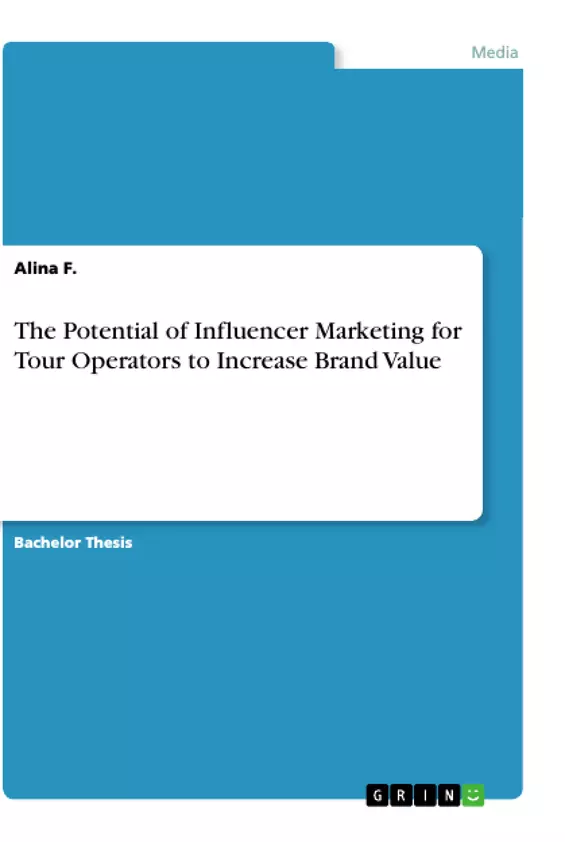This paper examines the com-ponents of Influencer Marketing with its target groups, potentials and risks.
Nowadays, it is becoming increasingly difficult for companies to reach potential customers, which is due to a society flooded with stimuli and advertisements. The Marketing activities of companies are in a state of change, due to the many possibilities offered by the Internet. Tour operators also struggle with this, as they can hardly reach certain target groups via traditional media anymore.
From a consumer's point of view, the generation change has opened up a new target group, most of which are online. Another problem is that consumers are less and less trusting in traditional media and are instead following recommendations from friends and acquaintances. Companies must react to this trend and are forced to find alternative communication methods and integrate them into their existing Marketing system. One of these tools is Influencer Marketing, which many companies are now using and integrating as an important part of their Marketing mix.
Inhaltsverzeichnis (Table of Contents)
- Introduction
- Methodology
- Definitions and Principles
- Tour operators
- Brand Value
- Marketing
- Online Marketing
- Influencer Marketing
- Generation Y
- Generation Z
- Fundamentals of Influencer Marketing
- The role of Millennials and Generation Z
- Consumer behavior
- Black Box Model - Stimulus Response Model
- Motivation theory
- Development and Trends of Influencer Marketing
- Classification of Influencer Marketing in the Marketing Mix
- The role of Influencer Marketing for Companies
- Communication channels - social networks
- YouTube
- Snapchat
- Blogs
- Success Measurement of Influencer Marketing
- Sustainability and Professionalization of Influencer Marketing
- Influencer Marketing for tour operators
- Impact of Influencer Marketing on the Travel Decision Process
- Brand image and Brand awareness in tourism
- Practical examples
- Opportunities and risks of using Influencer Marketing with Tour Operators
- Opportunities and advantages of working with an Influencer
- Reach
- Reachability of target groups
- Long-term cooperations
- Wide range of possible applications
- Trust in third parties, content longevity and double benefit
- Reorientation for the creative department
- Credibility and Influence in Buying decision
- Micro Influencers
- Expertise of Influencers
- Take action against advertising fatigue
- Risks and Disadvantages of working with an Influencer
- Selection of a suitable influencer
- Labelling obligation
- Offline advertisement market still dominates
- Conflict potential within the relationship conditions
- Loss of control
- Compensated Cooperations
- Cost factor
- Opportunities and advantages of working with an Influencer
- Empirical Study/Research Results
- Qualitative Results
- Reliability of Influencers
- Factors for successful campaigns
- Qualitative Results
Zielsetzung und Themenschwerpunkte (Objectives and Key Themes)
This bachelor thesis aims to explore the potential of Influencer Marketing for tour operators in enhancing brand value. The study examines the components of Influencer Marketing, its target groups, and its potential benefits and risks. The focus lies on the integration of Influencer Marketing into the marketing mix of tour operators and its effectiveness in reaching specific target groups.
- The role of Influencer Marketing in brand value creation for tour operators
- The influence of Millennials and Generation Z on consumer behavior in the tourism sector
- The impact of Influencer Marketing on the travel decision process
- Opportunities and challenges of working with influencers in the tourism industry
- The importance of identifying and selecting the right influencers for specific target groups
Zusammenfassung der Kapitel (Chapter Summaries)
The thesis begins by introducing the topic of Influencer Marketing and its increasing relevance in today's marketing landscape. Chapter 3 provides definitions and principles of key terms, including tour operators, brand value, marketing, online marketing, and Influencer Marketing. The chapter also discusses the characteristics of Generation Y and Generation Z, highlighting their significance as target groups in the tourism sector. Chapter 4 delves into the fundamentals of Influencer Marketing, exploring the role of Millennials and Generation Z, consumer behavior, and the development and trends of Influencer Marketing. The chapter also discusses the classification of Influencer Marketing within the marketing mix and its role for companies. Chapter 5 focuses on the application of Influencer Marketing for tour operators, analyzing its impact on the travel decision process and its contribution to brand image and brand awareness. Finally, the thesis concludes by outlining the opportunities and risks associated with using Influencer Marketing in the tourism industry. The chapter explores the advantages and disadvantages of working with influencers, including reach, reachability of target groups, long-term collaborations, and cost factors.
Schlüsselwörter (Keywords)
The key concepts and themes explored in this thesis include Influencer Marketing, Millennials, Generation Z, tour operators, brand value, consumer behavior, travel decision process, brand image, brand awareness, opportunities, risks, reach, reachability, and cost factors.
Frequently Asked Questions
How can Influencer Marketing benefit tour operators?
It helps increase brand value and awareness by reaching online-savvy target groups who trust personal recommendations more than traditional ads.
Which target groups are most relevant for Influencer Marketing?
The primary focus lies on Millennials (Generation Y) and Generation Z, who spend a significant amount of time on social media.
What are the main risks of using influencers in tourism?
Key risks include the loss of control over content, the difficulty of selecting the right influencer, and legal labeling obligations for advertisements.
Which social networks are best for travel marketing?
The thesis analyzes platforms like Instagram, YouTube, Facebook, and travel blogs as essential communication channels.
What is the "Black Box Model" in this context?
It is a stimulus-response model used to understand consumer behavior and how marketing triggers influence travel decisions.
- Quote paper
- Alina F. (Author), 2019, The Potential of Influencer Marketing for Tour Operators to Increase Brand Value, Munich, GRIN Verlag, https://www.grin.com/document/922846



